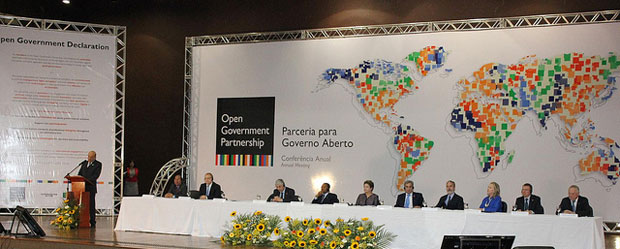Spanish version / ver en español
The following is adapted from a speech by Elisabeth Ungar, Member of Transparency International’s Board of Directors and Executive Director of Transparencia por Colombia, at the Open Government Partnership‘s annual meeting in Brasilia on 15 April 2012. The full speech is available here.
I hope that the Open Government Partnership will accelerate a trend for greater transparency in public life, and a more active participation of civil society in public issues.
Transparency International, with chapters to be found in nearly all of the OGP-eligible countries, will work with their CSO partners and the government towards the best possible outcomes for the OGP. In countries that are not currently eligible, but where we have chapters, such as Argentina and Venezuela, we will also work towards generating conditions so that those countries may hopefully one day become eligible.
OGP presents a unique working relationship that can be modelled elsewhere. It is a partnership that it brings together the support of governments, civil society and the private sector to change the way that governance is understood and delivered. And to improve the lives of millions of citizens around the world.

The open government agenda in Latin America
People often hoard information, because information is power. Governments who want to empower their citizens to fight corruption should seek to share information, and with it power, with their people. This right can be enshrined in Access to Information legislation.
With wide-ranging laws passed in Brazil, Mexico and Chile in recent years, as well as that being discussed in Colombia today, this region is setting a standard for others to follow. Many countries in our region are not just satisfied with laws, but also making sure the spirit of transparency applies throughout government.
Here are just a few examples of this trend: Chile’s 2009 Law on Transparency and Access to Information and its Transparency Council; Brazil’s new Access to Information Law; Mexico’s law and office; Bolivia’s contracting out of state-owned firms on live television; or the ongoing debate on an access to information law in Colombia’s parliament.
Let’s ensure that other countries and regions follow this trend.
Open government, but open to whom?
Opening government is a laudable goal, but the question that must be asked today is, open to whom? To public servants and experts? Or to citizens?
Access to information laws are important, but their impact on opening government will be limited if citizens are not able to use them, or don’t know how.
Access to information needs to be two-way: supply and demand.
Citizens today have access to a mass of information.
But in many cases they do not have access to the information needed to participate proactively in decision-making processes and the design, implementation and monitoring of public policies. That is, to become true political actors.
Opening the door to government is only the first step. We have to make sure that citizens know the doors are open. That they know where the doors are. That they can cross those doors, and above all, in so doing, their safety will not be endangered.
The state must proactively disclose information, and citizens need to capture the spirit of demanding it.
Access to information is NOT a gift, is a right. It enables other rights such as education, health and housing. Even the right to life can be protected with timely information. But information is also essential in the fight against corruption.
Even when government tries to open up, if public understanding of their rights curtailed, then their ability to participate in political life will be limited
Civil society and the OGP: Open government requires political will
For the OGP to reach its goal, it is essential that each participating country fully engages with civil society at every step of the way.
The big difference between OGP and other initiatives that existed in the past is that OGP does not treat civil society as a spectator.
Civil society groups offer decades of experience in trying to make government and society more open. Civil society has also suffered the consequences of closed governments and closed societies.















 Connect with us on Facebook
Connect with us on Facebook Follow us on Twitter
Follow us on Twitter